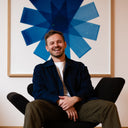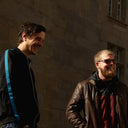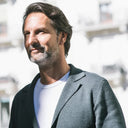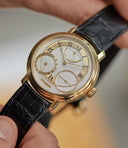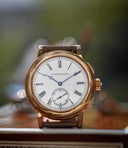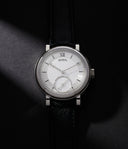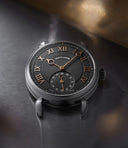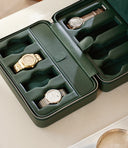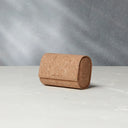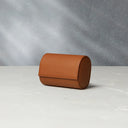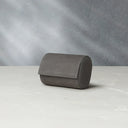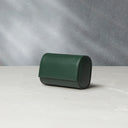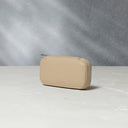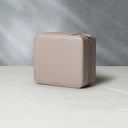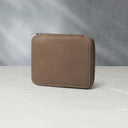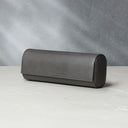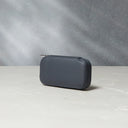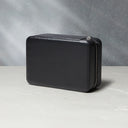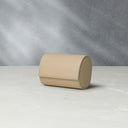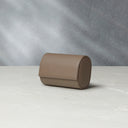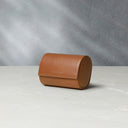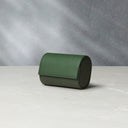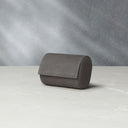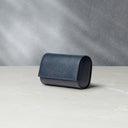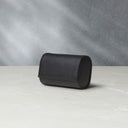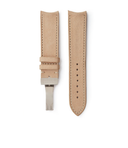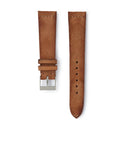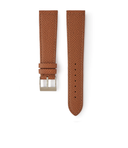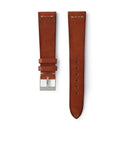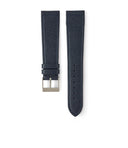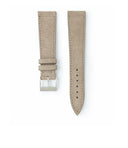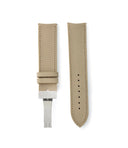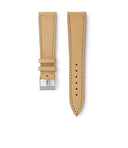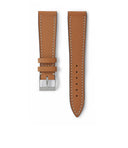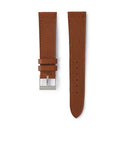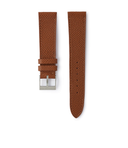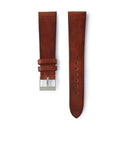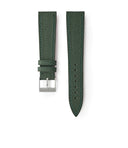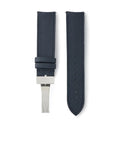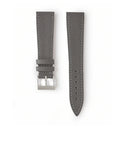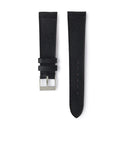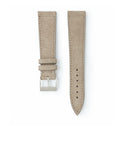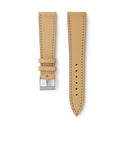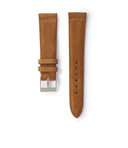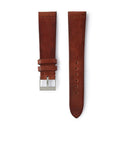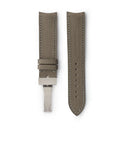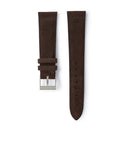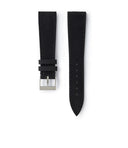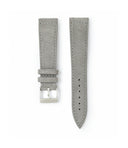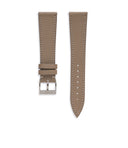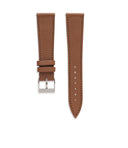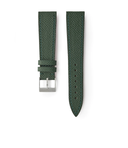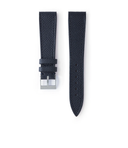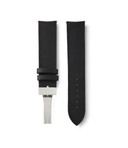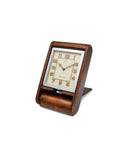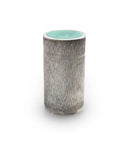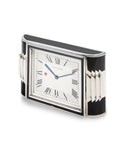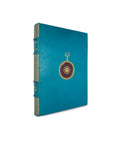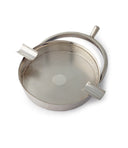About Town With: Hector Muelas in Paris, France
For the latest instalment of About Town, we could think of no one better to show us Paris than Hector Muelas, the Chief Brand Officer of Rimowa. Having cut his teeth at the German edition of VICE Magazine, becoming Editor In Chief at the ripe old age of 23, Hector has earned a meteoric career in marketing, working with brands like Nike, Coca-Cola and Apple to name a few. While enjoying a little down-time after leading Rimowa’s latest campaign featuring the likes of Roger Federer and LeBron James, we convinced Hector to show us a few of his favourite spots around Paris.
Tell us a bit about your relationship with the city of Paris…
Well, I have a love-hate relationship with Paris. Ordinarily, I have quite a polarised feeling for cities, but with Paris, it’s both, constantly. There are elements to the city which make me fall in love over and over again, but on the flip side, having grown-up in an Anglo Saxon culture which is more ‘customer-centric,’ there are characteristics that are difficult to get used to…
[Laughs] We’re talking about attitudes in the service industry, right?
[Laughs] In short, yes. I think the attitude is stronger here. It’s almost comical and you see it right through a number of industries, from the dude that instals your internet at home, all the way to the banks and everything in between. I’m not making any moral statements about it, to be clear, It’s just something I’m unused to.
By contrast, what are the positives?
You have arguably the most beautiful city in the world, memorable architecture, memorable food, there’s an obsession with sourcing; whether that might be products or food, where things come from is very important to the French. This approach to sourcing is something that I adhere to in my life philosophy.
Right…
There is a very genuine celebration of life here, it’s not hedonism, I think that’s bad marketing for the French.
Now, the first location on our tour of your regular haunts is The Broken Arm which is a coffee shop and concept store?
Yes, exactly. The store is pretty experimental in terms of its fashion, and as you can see I don’t dress like that, but I like to go and see what’s new, what’s happening in that world. Often times you only get to see these types of collections if you are invited to the showrooms, so it’s a good place to see all that.
And this informs your work to a degree?
Absolutely, I’m less and less interested in the product stores sell and more interested in consumer behaviour, which is definitely part of my job. I like to be informed of the types of people that visit these shops, how they shop, what they do, identifying micro-trends here and there; like the cassette tapes they were selling, it’s interesting to understand why they’re making a comeback for whatever reason.
And they presumably have a nice cup of coffee to offer…
That too. It’s opposite a nice park, so I like to take my kids over there or sit outside on the terrace and read.

Hector enjoying a coffee in front of The Broken Arm
Seems like a good place to people watch…
[Laughs] Yeah, very niche people watching...
You presumably have a few spots around the city to keep up with micro-trends and consumer behaviour, right?
Yeah, there isn’t a single source of inspiration for that. This is a bit of a tangent, but I’m going to likely shut-down my instagram because as creatives, we have to be very precious with the sources of inspiration that we use. Back in the days of Tumblr, we all used the same references and all the work looked the same. I think a similar thing is going on with Instagram, we’re all referencing one another too much.
The days of hitting an old book or a museum for inspiration seem long gone for most…
I want to go back to when I was 18, trawling record stores, going to shows and clubs, to somehow land on an idea. I’d like to go back to a more analogue approach to inspiration gathering, going places, experiencing things. The creative process is very hard to track, for example, I liked the tapes in The Broken Arm and I don’t necessarily want to make tapes, but that’s stored somewhere in my subconscious and will likely come out somewhere in a project.
"The creative process is very hard to track, for example, I liked the tapes in The Broken Arm and I don’t necessarily want to make tapes, but that’s stored somewhere in my subconscious and will likely come out somewhere in a project."
You might use that as the starting point for a project involving nostalgia, for example?
Yeah, the broad theme or being ironic about black metal or something. I don’t know how that will materialise, but I know that is something that will eventually stir in my brain to the point that it becomes something, does that make sense?
Yeah, that makes perfect sense. Had you always intended getting into marketing?
To be honest, I didn’t have a plan. I knew I was good with words and communication, building narratives and building arguments and visuals, but I didn’t know exactly how that would become a career.
Growing up in Barcelona, was pursuing a creative career a reasonably viable option?
Back then, the work landscape was perhaps a little more conservative than it is today, though that isn’t exclusive to Barcelona by any means. When you have that skill set, there are a few clear paths which include advertising, film directing or journalism. Of those three, I initially picked journalism as a career.

Hector browsing in The Broken Arm
What made you go down that path?
I think I felt a sense of necessity to having my opinion heard [laughs].
[Laughs] Ok…
I started writing for some fanzines on culture, music and fashion, which progressed into writing for local magazines, then national lifestyle magazines. That carried me through university and then following that I had a choice to go to Milan or Berlin and, back then in 2001, Berlin seemed really interesting, so that’s where I ended-up.
Did you speak German?
Nope, so I couldn’t do a post-grad programme there because of that. I did fall in love with the city though, so I stayed.
"That’s a testament to how instinctive they were back then, because they felt I was the right culture fit for them, and they just saw the translation issue as a small hurdle that we could fix."
You then ended up becoming the editor of the German edition of Vice…
[Laughs] Yeah, I was the editor in chief of the German edition of Vice without being able to speak a lick of the local language. That’s a testament to how instinctive they were back then, because they felt I was the right culture fit for them, and they just saw the translation issue as a small hurdle that we could fix.
That was your first job?
Yeah, can you imagine at the age of 23 landing that role? It was nuts.
Where did your career take you after that?
Four or five years down the line I got an opportunity to join the advertising agency Wieden & Kennedy, in Amsterdam.
How was it transitioning from editorial to advertising?
It was a natural transition because towards the end of my time at Vice, most of my time and effort was not in editorial, but in developing concepts for brands that we were working with. I was really attracted to the idea of problem-solving, applying my skill-set to make work for brands.

About Town with Hector Muelas, Chief Brand Officer of Rimowa
How was it at Wieden & Kennedy?
It was great, I learned a hell of a lot there. I started my career in advertising relatively late, aged 28, and dove right into working on Nike and Coca-Cola which were…
Arguably two of the best to start with…
Definitely. It wasn’t without its challenges though, because this was my first job where I wasn’t the boss.
That’s potentially difficult…
And don’t forget that at Vice we were told that we were stealing the dollars from traditional advertising agencies and that all the clients wanted what we had. Back then, native advertising as it’s now called, didn’t really have a name, it was seen as the ‘Vice thing.’
"I went into this agency being a cocky little asshole, trying to tell all these big brands that their ways were old. The first three or four months were a bit of a slap in the face, because I was being a know-it-all arrogant little twat."
Right…
So, I went into this agency being a cocky little asshole, trying to tell all these big brands that their ways were old. The first three or four months were a bit of a slap in the face, because I was a bit of a know-it-all arrogant little twat. The realisation that I was being a twat, and that I had a lot to learn, was the point that I started to progress. I had to pretty much unlearn everything I had been taught.
And what was it that you learned initially?
I learned that in marketing and advertising, much like journalism, you need to find the core truth of the brand. This is why working for Nike is so interesting, because when they say Just Do It, it’s not some marketing bullshit construct created in a room, it’s rooted in a historical reality about the brand, and in their mission as a company. The same framework can be applied to any brand and they teach you how to do that, how to create a voice, both verbal and visual that feels unique to each brand.
Was it quite daunting to be working on such colossal brands with creatives who had been doing it for a long time?
Definitely, I had to learn from scratch and it wasn’t an easy process; these guys who have been doing it their whole lives are really good at what they do.

The Marche des Enfants Rouges in the Marais
What was the biggest thing you’d learned at Vice that you needed to forget?
It became quickly clear that bigger brands like Nike need latitude. They need to have dimension and personality spanning more categories than you might imagine. For example, a brand like Nike has space to be cranky, funny, political and then there are moments for emotional heaviness but it will always feel unapologetically Nike in its message.
Absolutely…
There’s such a solid vernacular in terms of voice, in terms of visual language for that brand. That’s the advantage of working for big brands is that you get to learn the rules and play with them a little bit.
So, the second stop on our tour of Paris is a little hidden food market...
Yes, so Paris is inundated with markets, some outdoors, though this one is indoor and it’s in operation every day of the week.
The food is quite special here…
Yeah, the food is insane. I love going to markets because we tend to mostly cook at home and we really care about where our food comes from, particularly where the meat is from. The meat we eat has to be 100% grass-fed and grass-finished, because it has a very different nutritional profile and this is available from a butcher here in the market.
"I like that you can track where this food is coming from, how they treat the animals, the environment the animals are kept in. This is a real luxury, to have a direct line to the farm."
This feeds into what you were saying about the emphasis the French put into sourcing…
Exactly, I like that you can track where this food is coming from, how they treat the animals, the environment the animals are kept in. This is a real luxury, to have a direct line to the farm.
What would a typical visit to the market consist of?
I would head over there of a morning, pop-by the butcher and buy meat for dinner and then we’d stop by one of the stalls that cook the produce right there and have some lunch.

Hector showing us Paris' oldest covered market
Tell us a little about the stall you took us to for lunch…
So, that place is a mixture of French Mediterranean food which is made by Japanese chefs, who come to Paris to train. In fact, all the people that work there are Japanese, so I would say there’s perhaps in my mind a perceived level of attention to detail that comes naturally from that culture.
1,000 years of dedication…
[Laughs] 1,000 years of dedication to make the best piece of roasted pork you have ever eaten in your life.
Which, honestly, it was…
Yeah, they’re fantastic there. You have the benefit of all the great produce, sourced from the best possible farms, all the vegetables come from biodynamic growers. The produce comes freshly from the immediate vicinity, which is then cooked by these Japanese chefs, I like the contrast, you find this kind of thing often in Paris.
"The produce comes freshly from the immediate vicinity, which is then cooked by these Japanese chefs, I like the contrast, you find this kind of thing often in Paris."
Does the market serve as another people-watching, inspiration location?
Definitely, the market itself is a place that I like to go to for inspiration. Not that one specifically, but I like to go and experience as many of them as I can. You get to experience these micro-worlds in each of them; the market is like a little galaxy filled with planets that you can visit for a brief moment.
They each have their own story to tell through the produce they serve…
They’re very sincere experiences. The experience you get in retail is great, very visual, sometimes audio-visual but in these types of places you get all of your senses activated, and that’s really interesting. What that experience does to your brain, the combination of all these senses working together.
It’s a totally engaging experience…
Your synapses are just on fire in a place like that. Like we were having a conversation about Corsica, eating oysters, talking about and eating chestnut fed pork, it’s a really interesting experience that you only get by going there.

Chestnut-fed pork at the market
Visually they’re quite stunning places sometimes also…
They are for sure, and the word marketing comes from market. These places are the most rudimentary displays of brand building, right, because everything from the apples for '3.99' sign to the bartering and conversations, I mean, everything you need to know about marketing and branding you can find in a market.
[Laughs] Quite true…
I mean, take customer relationship marketing, dude, that’s in the markets because they know you personally, they know your wife’s name, your birthday, your kids, the apples you like and all without software!
[Laughs] That’s kind of it in a nutshell really, isn’t it, it’s a very offline environment…
Yeah, and you end-up having conversations and experiences that you otherwise wouldn’t have enjoyed. Not to sound like an old fart here though, because I love technology, I adore it even. I’m just very interested in changing the methods of how ideas are originated for creativity.
"The move to Apple was quite lucky timing because Apple were at a point where they had begun the shift to a more brand-centric approach to communications."
Speaking of technology, you moved to work with Apple following Wieden & Kennedy…
Not exactly, I was at Creative Artists Agency for two years, then Media Arts Lab, which is an agency dedicated to Apple, then I was working as part of the internal marketing team at Apple. The move to Apple was quite lucky timing because Apple were at a point where they had begun the shift to a more brand-centric approach to communications.
They were moving away from the clean product campaigns?
It used to be very much focussed in communicating the functional benefit the product would have rather than the emotional benefits. There was a feeling that the communication should be more balanced and have a bit of both - left and right brain.
What were some of the early campaigns you were working on?
The iPad was one of the early projects we worked on and that was about the iPad having become a tool for creatives worldwide. After that, we worked on the 30 Year Anniversary of the birth of the Mac, which was effectively the 30th anniversary of Apple, and that was a big campaign which we shot with Ridley Scott and his son.
The same director as the famous 1984 campaign, right?
Yeah, exactly.

Ceviche in the Marche des Enfants Rouges
Seems quite fitting for the anniversary…
Yeah, and then we worked on the launch of the Apple Watch.
Wow, that must have been interesting to hear about before its launch. What were your first impressions?
The first impression was that it was an amazing product with incredible potential to change the world. You know, this was another step for technology getting closer and closer to you. I remember being quite excited from the point of view of communicating this product, I felt that there was a lot we could talk about in relation to the product.
What sorts of things?
Well, the health aspect of it was a very interesting starting-point as well as the beautiful design of it. There’s a lot of craftsmanship there. This being the launch of a product, we felt that introducing it in broader strokes would be the right approach, that this product had elements of health, style, functional tech, superior design, etc.
Is it particularly challenging communicating products which are quite different to what the consumer has been used to seeing?
Well, you’re not just introducing a new piece of technology, you’re introducing a behaviour, which Apple has always been very adept with. The easiest way to approach that is through education and inspiration, letting the consumer understand where this fits into their lives.

About Town in Paris with Hector
Were you interested in watches previous to working on the Apple Watch?
No, I became really obsessed with watches after that project and then the obsession peaked when I joined LVMH.
Before we touch on your career with LVMH, let's talk about the third stop…
Right, that was Yvon Lambert, which is an art book store. This is one of the iconic book stores in Paris, which used to be attached to a gallery, but they’ve moved to a bigger location now.
There are actually a few bookstores that you particularly like around Paris right?
Yeah, there are a really great selection to choose from.
What do you look for?
I think with these types of stores, and I’m not saying anything new here, but it’s about the curation. It’s all about taste. This is the key in my working life too, because when I look for people who I want to collaborate with creatively, I always want to understand their taste level. By this, I don’t mean good taste or bad taste, or do you like button-down Oxfords or stupid stuff like that…
"I always want to understand their taste level. By this, I don’t mean good taste or bad taste, I’m looking to understand what their latitude is. These guys have loads of artists editions, limited edition prints and catalogues that the galleries produce."
Ok…
I’m looking to understand what their latitude is when it comes to taste and so that’s the same when I’m looking at a bookstore. These guys have loads of artists editions, limited edition prints and catalogues that the galleries produce.
A lot of which vanish after a certain point…
Exactly, so if you’re really into an artist, you’re likely to find really obscure works that you otherwise wouldn’t have found.
The works that get bought and vanish forever…
Correct, forever. The ones that the artist doesn’t want you to see when they get famous.

The Yvon Lambert Bookshop in Paris
Does the fact that they’re independently-operated mean something to you?
Yeah, of course. I like supporting that scene, I like that they put effort in places you wouldn’t expect, like at Yvon Lambert, instead of a pile of flyers for some tequila bar, here you get the free New York Times.
And they actually have quite a broad-offering, even into a realm that you might not expect…
Like the 300 page book of screenshots of every book that has ever featured in the Simpsons [laughs].
Which ranges to prints and artworks that you can buy, quite like the piece you found today…
Yeah, the selection in there is great. I found a screen print on newspaper which I liked a lot, so I picked that up. So often, I’d just take a picture of these kinds of things to remind myself, which is probably not the coolest thing to do, but that’s the modern way. Sometimes having the physical object is the only way, like when I was younger, I would pick up a catalogue from a Swedish clothing brand, for example, simply because I liked the texture of the print or the colours.
Where do watches fit into your life because you mentioned before that you became really taken with them when you joined LVMH?
Yeah, it’s not necessarily anything to do with the brands at LVMH, but working there lead to me appreciating what they were in a deeper way. I’ve always been obsessed with things that are consciously very well made, which applies to food, architecture, to everything.
Right…
That was partly why it was a dream to work for Apple because the circuitry is a perfectly calibrated engine.
That was famously something that Jobs was obsessed with on the original, hand made computers, wasn’t it?
Yeah, exactly. So, with LVMH craftsmanship is at the very core of that business, so you begin to look at everything around you through that lens. Watches are something which adhere to this line of thinking and so looking at them through that lens lead to an appreciation of the craft. There might also be an element of vanity to it…

Hector browsing in Yvon Lambert, wearing his Patek Philippe Aquanaut
[Laughs] How so?
I generally wear a plain white t-shirt and a pair of jeans and so it becomes a nice way to dress that up in a subtle way. Those who know or care will say something, and it will be invisible to those who don’t.
Like a secret society…
Ordinarily these kinds of statements are expressed through clothes or cars and I don’t really care for those things, so I make mine through my watch.
Makes a lot of sense…
A nice Patek Philippe is a great way of saying in a whisper who I am, my values and the things I care about.
"A nice Patek Philippe is a great way of saying in a whisper who I am, my values and the things I care about."
It will certainly dress up a white t-shirt…
[Laughs] Exactly, there is a certain level of finesse required to getting away with dressing in a white t-shirt. That interest in watches, naturally developed. As we are all aware, once you start scratching the surface, there are so many layers to it, that it becomes an obsession.
The kinds of watches you gravitate to aren’t a million miles away from the Apple Watch also, is that intentional?
Maybe. I think good design follows similar principles, functional needs must inform design decisions, that’s Bauhaus 101. A lot of the watches we have spoken about and that I own follow that design language.
Funnily enough, two of your more prominent watches, the Nautilus and the Royal Oak are obviously designed by the same guy and the third, the Aquanaut, is clearly inspired by…
[Laughs] I know…
Do you have a Gerald Genta obsession?
No, no, It’s just because they’re iconic pieces of design. I’m not exactly reinventing the wheel buying these pieces, because they become early grails for any watch collector.

"At Yvon Lambert, instead of a pile of flyers for some tequila bar, here you get the free New York Times"
What was the first of those three that you picked up?
The Royal Oak Ultra-Thin was the first.
How did that first major purchase feel?
You’re like a kid, you know, you can’t stop looking at your wrist. I definitely wore t-shirts more actively, when I got it ‘cause I wanted to prove the thesis that I had built in my mind to justify the amount of money spent.
[Laughs] Did it work?
In my mind it did. 99% of the people around me probably didn’t care though [laughs]. Probably most people had no clue what my whole thesis was about, but it validated it for me sufficiently.
That’s what counts. So, before we get onto your final Parisian recommendation, let’s talk about your recent work with Rimowa. When did the opportunity first present itself?
I had begun working for LVMH in New York, and then I was approached by Rimowa’s CEO Alexandre Arnault to see if I might be interested in taking a full time role at our Maison, as we call it. I grew up with the brand, and love it, so I agreed to come on board.
"I was approached by Rimowa’s CEO Alexandre Arnault to see if I might be interested in taking a full time role at the Maison, as we call it."
So, then you moved from NYC?
Yeah, we spent a year in Cologne, which is where the brand is based, and then as we spent more time in Cologne, we realised that it made sense to have my creative team closer to a more international city. This would enable us access to better talent and resources, so then we moved to Paris a year ago, where I have been for one year now.
What role were you under at LVMH previously?
I was a VP of Creative helping different brands within the group, but that made me miss the specificity of working for one brand, focussing in, you know…
Makes sense…
It became quickly clear after a conversation with Alexandre that there was a lot of synergy and good ideas floating around. The interesting problem with the brand was that they had an iconic product, but not an iconic brand. To be seen as an iconic brand, you have to behave like one.
Ok…
Most of the focus had been put into the functionality and craftsmanship of the product, but they hadn’t really spoken about what the brand stood for. I did some research into the archive and realised two things, a: there’s a really powerful story to the brand since 1898 and b: this isn’t a luggage brand, it’s a travel brand.

Le Barav, a wine bar/store near République
What did you find about the history in your research?
Travel was a costly luxury back in the 19th Century and so very few people had the ability. There were a few brands back then that made luggage for the fortunate few, one being Louis Vuitton, catering to an aristocratic clientele with the sentiment of, take me out of here, I want to see the world.
Right…
It was a luxurious wanderlust, very indulgent. RIMOWA was also catering to a very high-end demographic, but RIMOWA began making technical trunks for travelling professionals. If you were a doctor or an architect, an artist, you travel with RIMOWA.
A very clear distinction…
So we identified two characteristics, there are people that travel for distraction and then there are people that travel with purpose, which had never been articulated. We built the campaign around this principle featuring Roger Federer, Virgil Abloh, Yoon Ahn, Nobu Matsuhisa and Adwoa Aboah with the tagline, ‘No one builds a legacy by standing still.’
"There’s people that travel for distraction and then there are people that travel with purpose, which had never been articulated. We built the campaign around this principle featuring Roger Federer, Virgil Abloh, Yoon Ahn, Nobu Matsuhisa and Adwoa Aboah with the tag line, ‘No one builds a legacy by standing still.’ "
You worked with artists also for other elements of the campaign, what was the idea behind that?
In the ‘90s watching MTV, they had artists reinterpret their logo by a bunch of notable artists of the time, and that helped in making the brand the icon that it is. I thought, why not invite artists, illustrators, photographers and animators to reinterpret RIMOWA through their lens, with complete creative freedom.
And it’s working to great effect seemingly?
Yeah, absolutely. One of the most important things I learned in my career, and the thing I think I do well is to help build brands. What’s cool about this line of work is turning companies into brands, right? because companies are led by people, and people have opinions, but brands have frameworks, they have guidelines. The best thing about working for big brands like Nike and Apple is that the people may make the decisions, but the brand leads the position, right?
How so?
You might like jazz and I like metal or you might like golf and I prefer football, but when we all sit on that table looking at that advert, we are looking at it through the lens of the brand. We aren’t looking through our personal lens and to build that architecture for a brand takes time and it’s tough. The most difficult part is getting everyone to adhere to it.

A visit to Le Barav must include...
Now, finally we would be remiss not to talk about wine…
Yes. So, the final location is Le Barav, don’t ask me what it means, I really don’t know [laughs].
[Laughs] And what’s special about this place?
Honestly, the bar is nothing special and there are probably better ones, but what I like is that in the building there is a selection of wine which you basically cannot go wrong with. I don’t want to shop thousands of wines in isles in a supermarket, I want to be presented a selection.
They presumably put great care into that selection?
Yeah, and there is a big trend with natural wines here, whether in a Michelin-starred restaurant or in your neighbourhood drinking hole. This place is close by where I live, so it has become a ritual to visit.
How are the staff with educating people about wine and that sort of thing?
Oh, they’re a bunch of dicks [laughs].
"The best way to deal with those guys is by informing yourself and drop a few knowledge bombs on them [laughs]."
[Laughs] Oh…
Yeah, they’re a bunch of dicks, but that’s the way it works. You see this all over the place, even with watches, there is a first layer of information that you need to know, that’s the wall you have to break. The best way to deal with those guys is by informing yourself and drop a few knowledge bombs on them [laughs].
That’s certainly one approach…
I’m much more intellectually aggressive by nature than my wife. When someone is a dick to me, my instinct is to crush them intellectually because I know that I have a small gift for articulating things well. My wife, being obviously much smarter than I, has taught me to kill others with kindness.
The tactful approach…
[Laughs] Yes, delivering the knowledge with a velvet glove.
What does a typical visit to Barav consist of?
I like to work through regions, spending a month or two in each, trying to familiarise myself with the characteristics. Understanding the nuances between different producers and grapes is interesting to me. I usually stay on reds, something about a red wine suits my heart.
Do you ever dare ask questions?
I do, because I always want to learn learn learn, but often it will be met with very deadpan answers.
It depends on the quality of the question, in their opinion…
[Laughs] Yes, that’s exactly it.

Thanks to Hector for showing us around in Paris







